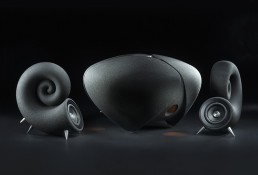Deeptime unveils Ionic Sound System
Czech design studio Deeptime has unveiled the first commercially available audio set made from sand. The limited edition Ionic Sound System combines organic design and innovative use of industrial 3D printing technology.
The Ionic Sound System consists of two passive satellite speakers and one active subwoofer, suitable for home and office interiors that allow its aesthetic and sound quality to shine. The sand enclosures, made using additive manufacturing technologies, are seamless with no visible bolts or joints, which improves both appearance and acoustic properties. The system is designed and optimised to provide the maximum possible acoustic power given the very compact dimensions of the individual speakers. The standard output power of the full sound system is up to 80 W / 160 W (RMS / PEAK power), while all the other components of the audio system, including the electronics, control rings and connectors are all custom manufactured for Deeptime.
The founders of Deeptime studio, Martin Hreben and Ondrej Chotovinsky, drew from their experience with industrial design in the automotive industry; the design process of this unique audio set thus influenced by the inventive approach and the demand for maximum quality design and production.
“For us, the design means looking for the form that reflects the nature and function of the product and builds on the benefits of the newest available technologies,” explains Hřeben. “We don’t want just to embellish existing standard solutions. That is the reason why our speakers do not use the standard cube or block shaped enclosures. Instead, we employ organic shapes designed to enhance the sound quality.”
Chotovinský adds: “We find inspiration mainly in nature. All shapes in the natural world are functional in one way or another. You’ll have a hard time finding regular cube or box shapes in nature.”
What makes the Ionic Sound System unique is the unconventional use of the 3D printing from sand, a technology known as sand printing or binder jetting. The additive manufacturing technique is mainly used to print molds for metal casting. Deeptime studio has developed a technological process, which turns the fragile and porous sand prints into airtight and resonance-free forms using custom made hardeners and pigments. In both appearance and properties, the resulting material evokes sandstone and displays effective acoustic qualities. The material properties combined with 3D printing technology allow Deeptime studio to design and manufacture speaker enclosures with virtually no limits of complexity and variability of the shapes or sizes.
The years of experience in hardware development further prompted the designers to produce their own set of circuit boards that drive and control the whole audio system. The heart and brain of the audio set consist of a switch-mode power supply, high-resolution DAC module, control board with Bluetooth chipset running aptX & AAC audio codecs and a powerful D-class amplifier with ultra-low noise levels.
The first foundations of what was to become Deeptime studio and the beginning of the development of the Ionic Sound System date back to 2014. Martin Hreben and Ondrej Chotovinsky, under the brand Akemake, introduced the world’s first speakers 3D printed from a wooden composite and went on to research new materials and manufacturing processes, fine-tune their designs for acoustics and aesthetics. In the future, the designer duo plan to expand the Ionic Sound System family with speakers of different sizes, multiple colour variants and surface finishes.
Related Posts
15 January 2020
Kimpton Angler’s Hotel unveils redesign
4 April 2017
Ibis unveils seasonal-themed hotel
20 December 2016




